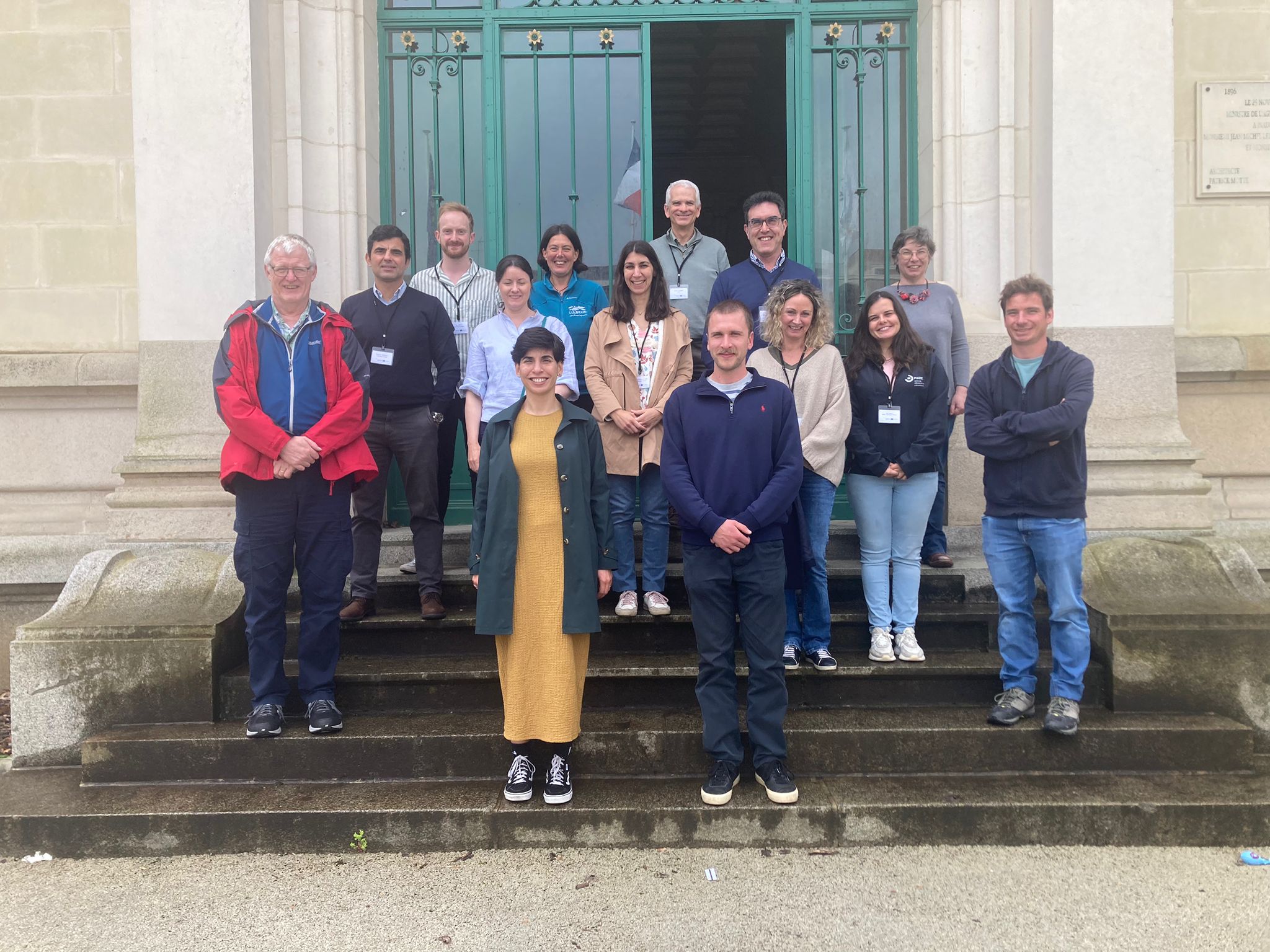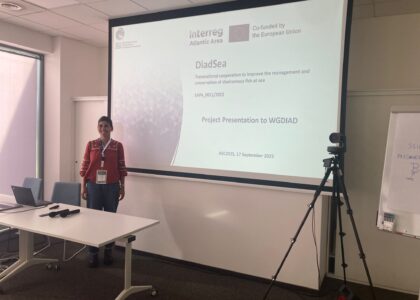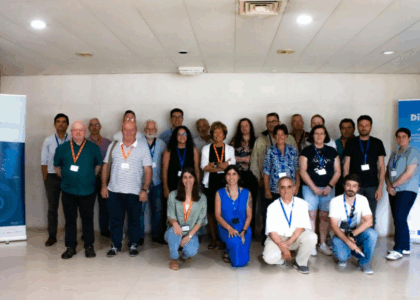DiadSea european project gathers in France to discuss the future of migratory fish in the Atlantic Area (05/2025)

The project is funded by the European Union, under the Interreg Atlantic Area Programme, with a total of 3,35 million euros.
- DiadSea project is a transnational cooperation initiative aimed at improving the management and conservation of diadromous migratory fish, such as lamprey, salmon, sea trout, shad, anadromous fish, among others, in the Atlantic Area. Diadromous fish are unique species that migrate between freshwater and saltwater environments throughout their life cycle. This complex life cycle makes the management and protection of these species particularly difficult, especially in the face of climate change.
- Led by the University of Évora / MARE, the Interreg Atlantic Area DiadSea project (EAPA_0011/2022) has several partner beneficiary and associated entities from different European countries, who gathered at INRAE, Rennes (France) on May 13, 14, and 15 2024 for the official project launch.
The event provided a first in-person contact among all partners and the presentation of the project to associated partners (legislative authorities, fishing association, companies, NGOs, cultural associations). On the second day of the meeting, the various workshops allowed partners to share their technical knowledge, present their contributions to the project, and plan future activities
Financed with 3,35 million euros by the European Commission and lasting 3 years, this project aims to improve the management and conservation of diadromous fish in the Atlantic Area. Diadromous fish are unique species that migrate between freshwater and saltwater environments throughout their life cycle. This complex life cycle makes their management and protection particularly difficult, especially in the face of climate change.
The project consortium consists of 9 beneficiary partners and 28 associated partners from 4 European countries (Portugal, France, Spain, and Ireland) and is coordinated by the University of Évora / MARE (PT), which also leads the communication and dissemination activities.
As for the other beneficiary partners, they include universities, research centers, and public institutes, such as Faculdade de Ciências da Universidade de Lisboa (PT), the Instituto Português do Mar e da Atmosfera (PT), the Marine Institute (IE), the Universidade de Santiago de Compostela (ES), l’Institut National de Recherche pour l’Agriculture, l’Alimentation et l’Environnement (FR), Muséum national d’Histoire naturelle – Station Marine de Dinard (FR), Association Loire Grands Migrateurs (FR), and Inland Fisheries Ireland (IE).
Thus, the following associated partners:
- Associação Natureza Portugal em associação com a WWF (Lisboa, PT)
- Comité National des Pêches Maritimes et des Élevages Marins (Ile-de-France, FR)
- Associação para a Promoção das Potencialidades do Rio Minho (Norte, PT)
- Clube de Pesca e Cultural de Penacova (Centro, PT)
- Associação de Pesca Desportiva do Rio Vez (Norte, PT)
- DREAL Hauts de France (Nord-Pas de Calais, FR)
- Office Français de la Biodiversité (Ile-de-France, FR)
- Direction Générale des Affaires Maritimes, de la Pêche et de l’Aquaculture (Ile-de-France, FR)
- Agência Portuguesa do Ambiente, I.P. (Lisboa, PT)
- Docapesca – Portos e Lotas, S.A. (Lisboa, PT)
- Clube de Pesca de Penacova (Centro, PT)
- The Navigator Company (Alentejo, PT)
- Asociación para a Defensa Ecolóxica de Galiza (Galicia, ES)
- Dirección Xeral de Patrimonio Natural, Xunta de Galicia (Galicia, ES)
- Vianapesca O P – Cooperativa de Produtores de Peixe de Viana do Castelo, C.R.L. (Norte, PT)
- EDP – Gestão da Produção de Energia, S.A. (Lisboa, PT)
- Direction Régionale de l’Environnement de l’Aménagement et du Logement de Nouvelle Aquitaine (Aquitaine, FR)
- Centre for Environment, Fisheries & Aquaculture Science (Dorset and Somerset, UK)
- Confraria da Lampreia (Centro, PT)
- The Rivers Trust (Southern, IE)
- Gobierno de Navarra (Comunidad Foral de Navarra, ES)
- Irish Federation of Sea Anglers – Angling Council of Ireland (Southern, IE)
- FigPesca – Associação dos Pescadores e Armadores do Centro Litoral (Centro, PT)
- Autoridade Marítima Nacional (Centro, PT)
- Sea Fisheries Protection Authority (Southern, IE)
Catarina Mateus, researcher at Universidade de Évora / MARE states: “We are committed to improving the management and conservation of diadromous fish in the Atlantic Area, fish that migrate between freshwater and saltwater environments throughout their life cycle. This complex life cycle makes their management and protection particularly difficult, especially in the face of climate change. Bringing together partners from the various countries where these species occur is essential for coordinated management and for the sharing of experiences in the protection of species that occur throughout the entire Atlantic area. The involvement of fishing associations, government agencies, NGOs, and other partners involved in the management of these species is crucial.”
DiadSea, the research project that will contribute to improving the management and conservation of diadromous fish in marine habitat
DiadSea aims to foster transnational cooperation in the Atlantic Area (AA) to enhance the sustainable management and conservation of diadromous fishes (DF) in marine habitat. Its objectives are to identify and fill knowledge gaps in marine habitat, the distribution range shifts of DF due to climate and oceanographic changes and develop innovative cooperative solutions to protect the biodiversity and natural resources of DF in marine habitat and subsequently in freshwater habitat.
DiadSea, a contribution to the social and regional cohesion policy of the European Union
Complementing the work of the DiadES European project, which focused on freshwater habitat, DiadSea now focuses on the marine environment, where there are serious knowledge gaps and less management and conservation of diadromous fish. Through the mapping and distribution of diadromous fish in the sea, identifying important areas for these species, this research project will apply the latest oceanic and climatic models to predict the future of these populations and thus create a large-scale diadromous fish observatory.
In this way, DiadSea strives not only to ensure a healthy marine environment, but also to promote economic and cultural benefits for local communities through the exchange of knowledge and the potential improvement of political instruments and public administrations proposed by the Interreg Atlantic Area programme promoted by the European Union.
About Interreg Atlantic Area
The Interreg Atlantic Area 2021-2027 supports transnational cooperation in the Atlantic regions of four countries: Portugal, Spain, France and Ireland. In this new programme, the commitment with the Atlantic regions is renewed in the support of innovative initiatives that contribute to the growth of this area, solving common challenges across border through the implementation of joint actions, exchange of good practices and contribution to new or current policies.
The programme budget for 2021 – 2027 is 113 million euros from the European Regional Development Fund (ERDF). The co-financing rate for projects approved is up to 75% of the total investment.



